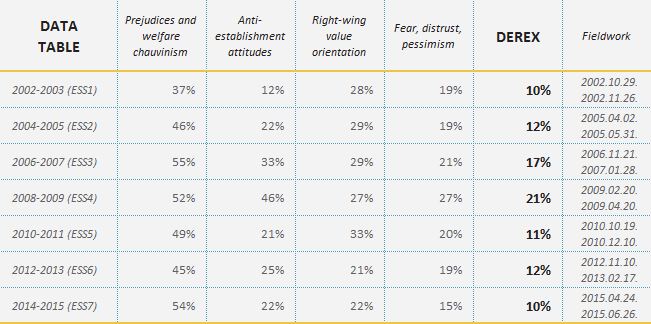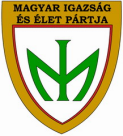Hungary
Factsheet
| ETHNIC MINORITIES: | |
|
Roma: |
7.05 |
| RELIGIONS: | |
|
Roman Catholic: Calvinist: Lutheran: Greek Catholic: Muslim: |
51.9 15.9 3.0 2.6 0.3 |
| NET MIGRATION: | 75,000 |
| POP. GROWTH RATE: | -0.3% |
| GDP GROWTH: | +2.7% |
| GDP PER CAPITA: | 12,531 |
| UNEMPLOYMENT: | 10.2% |

Jobbik Movement for a Better Hungary (Jobbik Magyarországért Mozgalom, Jobbik)

Jobbik on the Internet:
Source:
- Political Capital

Hungarian Party of Justice and Life (Magyar Igazság és Élet Pártja, MIÉP)

Hungarian Party of Justice and Life (Magyar Igazság és Élet Pártja, MIÉP) was established in 1993 by the well-known playwright István Csurka and a group of politicians who followed him after he was expelled from MDF (Hungarian Democratic Forum). MIÉP claimed that the first freely elected government after the change of the political regime did not leave any room for the advocates of popular and nationalist views in its leadership, failed to demand accountability from the leaders of the Socialist regime, relinquished the overall revision of the Treaty of Trianon, and nevertheless made no attempt to have the crippling foreign debts accumulated during the Socialist governance cancelled. MIÉP defined its stance as radical, national(ist), conservative and anti-globalist. The largest success of the party came in 1998, when MIÉP passed the parliamentary threshold having received almost 250 000 votes (5.5 %). In the 2002 elections the party received fewer votes (4.37 %) and thus dropped out of the parliament. As of today, MIÉP has become irrelevant, lost its place in the limelight entirely and practically vanished from the political spectrum as a result of Jobbik’s growth. This has been visible in the 2006 election results when MIÉP received 2.2 % of votes and especially in 2010 when it received only 0.03 % of votes. The recent death of István Csurka is likely to further affect its weakening.
MIÉP on the Internet:
Source:
- Political Capital
European Parliament elections - May 25, 2014


Parliamentary elections - April 6, 2014


Parliamentary elections - April 11, 2010


European Parliament elections - June 7, 2009

Our thematic websites
Political Capital's analyses and activities in English.
Research and advocacy programme focused on the role conspiracy theorising plays in shaping populist and radical politics.
Our project New electoral system in Hungary: watchdogging, advocacy and raising awareness focuses on the electoral reform in Hungary.
Our blog on political and societal extremism and conspiracy theories.
DEREX website is supported by










